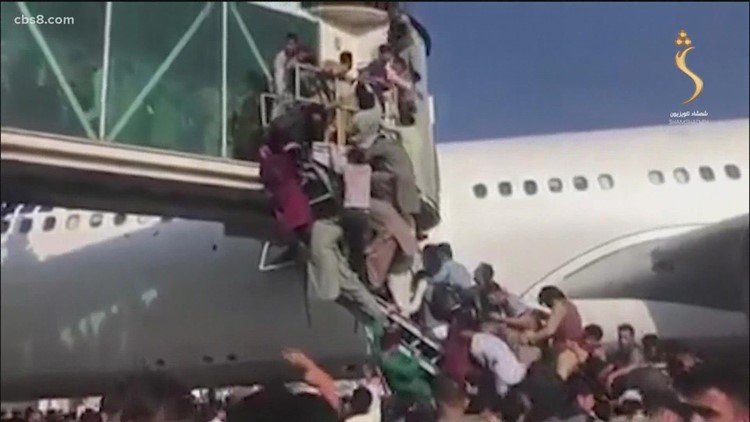BOISE, Idaho — Editor's Note: This article was originally published by the Idaho Press.
Boise resident Homeyra Shams woke up this weekend to “unbelievable” news: The Taliban had taken over her home country, Afghanistan, for the second time in her life.
Afghanistan’s government collapsed Sunday, surprising the world and leaving Afghans and Americans in Kabul in limbo.
“I have my older sister and my niece there,” said Shams, who along with three other sisters opened Sunshine Spice Cafe in 2019. “There is no way to have her come … we are just helpless right now.”
Shams fled Kabul when she was 2 or 3 years old, when the Taliban first took over.
Under Taliban rule, women were almost entirely banned from education and unable to leave their homes without a man. Shams said her and her sisters planned to work hard in the United States to help women in Afghanistan, a plan that is now vanishing.
Images of Afghans clinging to evacuating planes on Monday spread widely as a sign of the desperation many face ahead of the uncertainty posed by the Taliban’s return. Those images stuck with many in the Treasure Valley as they struggle to come to terms with the weekend’s developments.
“I just saw one video that two men, they were tying themselves at the tire of the airplane and then as the airplane flew, they fell to the ground and died,” Shams said. “It’s really hard to believe something like that is happening. They are fleeing from the fear of Taliban and they are dying like that.”
The United States invaded Afghanistan in fall 2001 after Congress almost unanimously authorized the use of military force in response to 9/11. Former President George W. Bush launched attacks against al-Qaida and the Taliban after al-Qaida planned the 9/11 attack from bases within Afghanistan. The Taliban declined to turn over al-Qaida leaders.
“The purpose basically went apparently from trying to root out al-Qaida to then into the dangerous realm of nation building, which is almost never a good idea,” University of Idaho Emeritus Professor of History Rick Spence said. “Almost 20 years of nation building didn’t work … I don’t think I’ve ever seen a regime collapse quite that quickly.”
Last year, former President Donald Trump negotiated a deal with the Taliban for the U.S. to withdraw from Afghanistan by May 1. Current President Joe Biden extended the deadline to the end of the summer and troops began leaving in early May.
The Taliban began a military offensive and took many major cities and provincial capitals during the course of the last week, culminating in the fall of Kabul over the weekend. There has been some debate over the resemblance to the fall of Saigon in 1975, especially as helicopters flew over the American embassy this weekend to take Americans to the airport.
Spence said the situation was exactly like Saigon.
Even as Americans leave, he said it was important to note it was only the end of U.S. involvement. Afghanistan has dealt with multiple conflicts over the last several decades.
“From the American standpoint, it’s been a 20-year war. From the Afghan standpoint, it’s been even longer,” Spence said. “There are basically two whole generations who have grown up in Afghanistan only knowing a war-time situation.”
One local veteran, Dan McKnight, is glad the United States is leaving the war but said the withdrawal was botched. McKnight, who lives in Eagle, served in the war and has long advocated for its end.
“People are going to die for it. Americans are going to die. Afghanis that supported us are going to die,” McKnight said. “It’s going to be a terrible, terrible loss of human life that’s going to lay in (Biden’s) hands. It just breaks my heart.”
The United States has evacuated close to 2,000 special immigrant visa applicants in the past few weeks, but 19,000 remain in line, not including family members.
Ramin Amini worked with the United States Army and became a citizen of the United States on Friday. He said he appreciates what the United States did for his home country of Afghanistan, including building roads, but added the U.S. has left Afghanistan alone.
“It feels so bad,” Amini, a Meridian resident, said. “Because we weren’t ready … now we are in the middle of nowhere. We don’t know where to go, what to do.”
Amini’s parents remain in Afghanistan. He said he’s uncertain if he will be able to continue sending money to help them out because of a fear the Taliban will close banks.
He also feels there is nothing he can do to help the people of Afghanistan.
“The only thing I can do is pray,” Amini said.
Carolyn Komatsoulis covers Meridian and Ada County. Contact her at 208-465-8107 and follow her on Twitter @CKomatsoulis.



